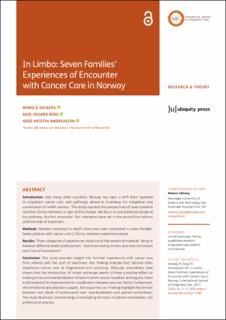In Limbo: Seven Families` Experiences of Encounter with Cancer Care i Norway
Peer reviewed, Journal article
Published version

View/
Date
2021Metadata
Show full item recordCollections
Abstract
Abstract Introduction: Like many other countries, Norway has seen a shift from inpatient to outpatient cancer care, with pathways aimed at improving the integration and coordination of health services. This study explores the perspectives of seven patients and their family members in light of this change. We focus on one particular phase of the pathway: the first encounter. Our interviews were set in the period from referral until the start of treatment. Methods: Nineteen individual in-depth interviews were conducted in seven families. Seven patients with cancer and 12 family members were interviewed. Results: Three categories of experiences stood out in the empirical material: ‘Being in between different health professionals’, ‘Overwhelmed by written and oral informationʼ and ‘Lack of involvement’. Conclusion: This study provides insight into families’ experiences with cancer care from referral until the start of treatment. Our findings indicate that families often experience cancer care as fragmented and confusing. Although evaluations have shown that the introduction of cancer pathways seems to have a positive effect on waiting times and standardization of examinations across hospitals and regions, there is still potential for improvement in coordination between services, family involvement, and emotional and practical support. We argue that our findings highlight the tension between two ideals of professional care: standardization and patient-centredness. The study illustrates shortcomings in translating the ideal of patient-centredness into professional practice. Keywords: cancer pathways, family, qualitative research, integrated care, patient-centred care. © 2021 The Author(s). This is an open-access article distributed under the terms of the Creative Commons Attribution 4.0 International License (CC-BY 4.0), which permits unrestricted use, distribution, and reproduction in any medium, provided the original author and source are credited. See http://creativecommons.org/licenses/by/4.0/.
